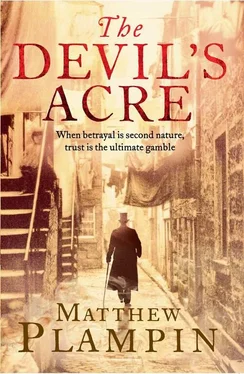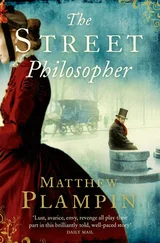The Devil’s Acre
Matthew Plampin

For Sarah
‘People may differ about matters of opinion, or even about religion; but how can they differ about right and wrong? Right is right; and wrong is wrong; and if a man cannot distinguish them properly, he is either a fool or a rascal: that’s all.’
George Bernard Shaw, Major Barbara, Act I
‘I will tell nobody what I supply my arms for. If you want to buy, and say you will buy ten thousand of them, and will give me a fair price, you can have them today.’
Samuel Colt, from the minutes of the Select Committee on Small Arms
Cover Page
Title Page The Devil’s Acre Matthew Plampin
Epigraph ‘People may differ about matters of opinion, or even about religion; but how can they differ about right and wrong? Right is right; and wrong is wrong; and if a man cannot distinguish them properly, he is either a fool or a rascal: that’s all.’ George Bernard Shaw, Major Barbara, Act I ‘I will tell nobody what I supply my arms for. If you want to buy, and say you will buy ten thousand of them, and will give me a fair price, you can have them today.’ Samuel Colt, from the minutes of the Select Committee on Small Arms
PART ONE Bessborough Place PART ONE Bessborough Place
1
2
3
4
5
6
7
8
9
PART TWO Crocodile Court
1
2
3
4
5
6
7
8
9
PART THREE The Devil’s Acre
1
2
3
4
5
6
7
8
9
10
EPILOGUE
1
2
3
AUTHOR’S NOTE
P.S.
About the book
‘England’s Foulest Graveyard’
About the author
A Q & A with Matthew Plampin
About the Author
Also by Matthew Plampin
Copyright
About the Publisher
PART ONE Bessborough Place
Colonel Colt was on his feet a good five seconds before the carriage had come to a halt, pulling open the door and leaping outside. A brisk spring wind was sucked into the vehicle like a mouthful of cold water, rushing underneath the seats, swirling through the hat-racks and almost scattering Edward’s sheaf of Colt documents across the floor. He tightened his grip on it, coolly shuffling the pile back into shape, and conducted a quick inventory. Something critical was missing. Looking around, he saw a finely made wooden case, slim and about fifteen inches long, resting upon the narrow shelf directly above where Colt had been sitting. He tucked it under his arm and followed his new employer down into the street.
Colt was issuing orders to the coachman while straightening his broad-brimmed Yankee hat. Behind him towered a mighty rank of Italianate façades, among the grandest in all London, belonging to a variety of venerable clubs, learned institutions and government offices. Edward could not help but be impressed. I’ve harnessed myself to a real rocket here, he thought; Pall Mall, the seat of power, on my very first morning! This post in the Colt Company was his great chance – an opportunity of a kind granted only to a few. To prove your worth to a man such as Colonel Colt was to set yourself upon a sure path to advancement. He checked his necktie (his best, claret silk, knotted with special care) and caught sight of his reflection in a panel of the Colonel’s mustard-yellow barouche. Possibly the largest private carriage Edward had ever ridden in, it stood out among the clattering cabs of London like a great lacquered beetle in a parade of ants. Upon its glossy surface he was reduced to a near silhouette, a smart, anonymous professional gentleman in a black frock-coat and top hat, his face obscured by shadow.
The Colonel glanced over at him. ‘Right here, Mr Lowry – the Board of Ordnance,’ he said, nodding curtly towards one of buildings. Then he bounded up the flight of stone steps before it, surprisingly swiftly for someone of his size, and shoved his way through a set of tall double doors.
Edward went after him, feeling both admiration and a little amusement. The American entrepreneur went about his business with a single-minded vigour far beyond anything he’d seen during his six years in the banks and trading houses of the City. This promised to be interesting indeed.
The hallway beyond the doors was every bit as magnificent as the building’s exterior, its floors covered with thick carpets, its walls lined with marble columns and its lofty ceiling positively groaning with gilded plasterwork. Portraits of British generals hung wherever one cared to look, their grizzled faces arranged into expressions of proud confidence as they stood to attention or leaned against cannon, conquered enemy citadels burning behind them. Pervading this sumptuous environment was an official hush so deep and still that it was almost accusatory. This is a place of the very highest importance, it seemed to say, where decisions are made that affect nothing less than the future of Great Britain; what the deuce are you doing here?
Entirely indifferent to this oppressive atmosphere, Colonel Colt strode up to the main desk and bade the smart clerk behind it good morning. The stare that met this salutation told Edward at once that they were not expected; no appointment had been made, and the clerk’s stance in such situations was abundantly clear. Unabashed, Colt went on to ask if he might drop in on Tom Hastings, an old friend of his who he believed was currently the Storekeeper of the Ordnance. He was informed that Sir Thomas was fully engaged that morning, and would not receive visitors without prior arrangement in any case.
‘So he’s in the building, at least,’ the Colonel interrupted with a hard smile. ‘Will you be so kind as to tell him that Sam Colt is at his door, and wishes to have a word? He’ll be interested, I guarantee it.’
The clerk would not cooperate, though, not even after Colt had introduced the possibility of a five-shilling note being left right there on his counter, to find whatever owner pleased God. So this is it, Edward thought. We are to fall at the first hurdle. It wasn’t quite the result he’d expected. The Colonel looked down at the carpet for a full minute, still smiling but growing red in the cheek. Suddenly, he barked out an impatient curse and lurched away to the right, cutting across the hall to a stairwell and sprinting straight up it.
Instinctively, Edward fell in behind him, ignoring the clerk’s protestations and the heavy footfalls that were soon gathering at his heels. Together they dashed through the corridors of the Board of Ordnance, skidding around corners and thundering down flights of stairs. Colt threw open doors at random, demanding directions to Hastings’s office from the startled scriveners within – a good many of whom, Edward noticed, were occupied with newspapers and novels rather than government business. In the end, as the crowd of their pursuers grew in both numbers and proximity, Colt simply bellowed out the name of his contact as he ran in the vain hope that this might draw him forth.
They were finally cornered in a remote lobby. A part of Edward was convinced that the police would now be fetched and they’d be led from that place in chains; but he also found that he had an unaccountable faith in Colonel Colt’s ability to rescue them from difficulty. Sure enough, instead of arrest, their detainment was followed by a brief and intense negotiation, during which the Colonel imparted his expectations with considerable forcefulness. A more senior figure was summoned, who in turn sent off messengers to several different regions of the building; and soon afterwards Colt was told that an audience had been granted with Lord Clarence Paget, Secretary to the Master-General of Ordnance, in a mere twenty minutes’ time. They were then taken to a vestibule on the second floor and left to wait.
Читать дальше













